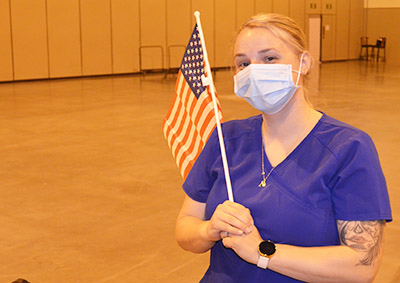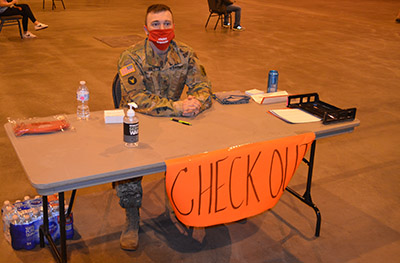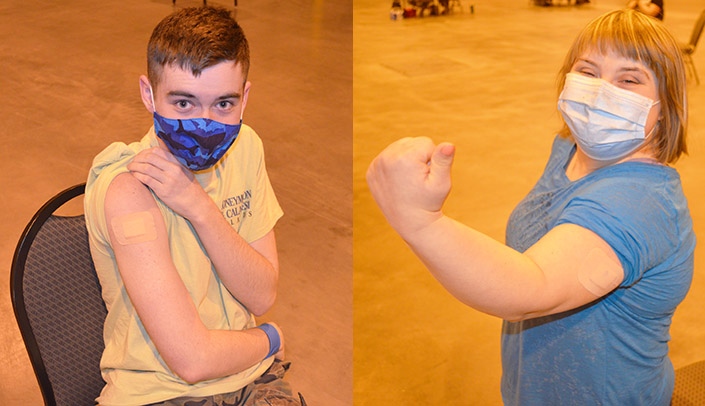The high risk that people with intellectual and developmental disabilities face from COVID-19 is well-documented.
A recent study in the New England Journal of Medicine concluded “having an intellectual disability was the strongest independent risk factor for presenting with a COVID-19 diagnosis and the strongest independent risk factor other than age for COVID-19 mortality. Patients with intellectual disabilities and their caregivers should be prioritized for vaccination and health care services.”
During the COVID-19 pandemic, UNMC’s Munroe-Meyer Institute (MMI) has been working to address the need for vaccination opportunities for people with IDD, as well as their parents and caregivers.
“One of MMI’s pillars is to act as an advocate for individuals and families affected by IDD, both those we serve and others throughout the state,” said Karoly Mirnics, MD, PhD, director of the institute. “In the face of the obvious danger to this population, we and our allies reached out right away to both the Douglas County Health Department and the State of Nebraska Department of Health and Human Services (DHHS).”
 |
Student nurse Tiffany Martinez was pleased to be on hand to help in the effort. |
Both organizations were “extremely receptive,” Dr. Mirnics said, and began working with MMI on the logistics of vaccine delivery.
Douglas County provided dedicated vaccinations to the IDD community over two weeks in March, working with MMI and partner organizations to alert clients of the vaccine availability.
Following Douglas County’s effort, Nebraska DHHS organized four clinics — the first COVID-19 vaccination clinics in the entire country to provide priority access to individuals with intellectual and developmental disabilities, their families and caregivers. The four events — held in Omaha, Lincoln, Grand Island and Norfolk — resulted in 1,176 vaccinations.
“I am grateful to the state and our colleagues and friends working at DHHS for partnering with MMI and others to hold this clinic and for their care for the IDD community in Nebraska,” Dr. Mirnics said.
The first of these clinics took place on April 2 at CHI Health Center Omaha, in the facility’s convention area. Future clinics are planned in Lincoln, Grand Island and Norfolk; dates and times will be announced soon by the state.
The reaction was robust: More than 600 people registered in advance for Friday’s event, and many walk-ins meant that by 2 p.m., organizers expected to use most if not all of the 1,000 vaccine doses allotted for the clinic.
David and Mary Jo, parents of 20-year-old Leah, were so excited by the opportunity that they drove from Lincoln to attend the event, saying it was important for their daughter to get vaccinated.
“Her immune system is weak,” said David of his daughter, a Special Olympics athlete. “I’ve been worried the whole time.”
Logan, 17, was at the clinic with his mother, Erine. Although he is on the autism spectrum, Logan said he was more interested in getting the shot because his 14-year-old sister also has intellectual and developmental disabilities.
Erine jumped at the opportunity to vaccinate her age-eligible son. “My husband and I are already vaccinated, but with our daughter at home, she needs her health protected a little more based on her conditions. So big brother is here getting vaccinated.”
The IDD-specific clinic was a welcome effort, Erine said.
 |
Families praised the workers staffing the clinic, calling them helpful and courteous. |
“I’m a medic by trade,” she said. “I believe and trust in science, so I want to be sure we’re doing as much as possible to get us all back to normal in this country.”
Tony Green, director of the Nebraska Division of Developmental Disabilities, said the DHHS has always prioritized people with IDD, and that he was happy to expand efforts so that vaccines could be offered publicly to everyone in the IDD community.
“It’s days like these that remind me why 30 years ago I decided to advocate for this population and have done so my whole career — this is exciting,” he said.
Kerry Kernen, division chief, community health, nutrition and clinical services, Douglas County Health Department, said she had worked with Dr. Mirnics on the county’s efforts, facilitated by the state, to reach out to MMI’s patient population with vaccination opportunities.
Green said that organizations such as MMI, Special Olympics and others have been helpful to the state throughout the COVID-19 pandemic. “From the beginning, we recognized that folks with IDD were a high priority for us. We started, with the limited vaccine we had early on; the advocacy groups continued to push us, and we listened.”
As Leah’s family was getting ready to leave the clinic on Friday, Mary Jo said it meant a lot that the state is holding clinics specifically for the IDD community.
“This is wonderful,” she said. “David and I have been vaccinated for several weeks now, but Leah is our main concern.
“I was thinking, ‘Somebody must have really pushed for this,’ and I’m glad someone did. I’m grateful.”

Our family and many others are so grateful for this opportunity to receive the vaccine. Thank you, MMI, DHHS and everyone who staffed this clinic!!